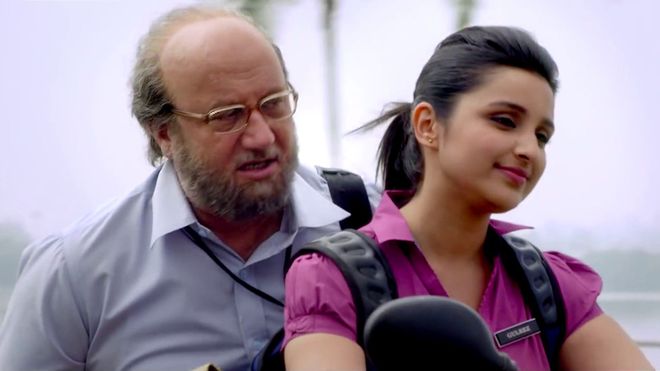Dad’s the word
Gautam Chintamani
Among other things, the boxoffice success of a film in Bollywood, especially when the film’s subject is slightly off the beaten path, allows the trade to welcome certain new ideas. On the face of it, Piku featuring Amitabh Bachchan, Deepika Padukone, and Irrfan might not be as small a film as it’s made out to be, or even as experimental, but it sure has struck a new high. Unlike many liberties that it is famous for, commercial Hindi cinema will like to believe that it mostly gets parent-children relationship right and while it may not be totally off the mark, it’s still very rare to come across one that looks real onscreen. And, the one that has suffered the most is the father-daughter tie.
Written by Juhi Chaturvedi, Piku is the story of a successful single working woman, Piku (Deepika Padukone), living in Delhi with her aging hypochondriac father Bhashkor (Amitabh Bachchan) and much to her chagrin, her entire social existence revolves around her father’s eccentricities, among which his chronic constipation tops the list. An unexpected emergency forces Piku to go on a road trip with her father to Kolkata, because he refuses to fly, and it’s on the journey that she realises not to be judgmental of parents. The irascible Piku understands her father better with a little help from Rana (Irrfan), the owner of a taxi fleet, who is forced by circumstances to drive Piku and Bhashkor to Kolkata. Perhaps it is Chaturvedi’s writing that makes Piku appear real and perhaps it’s because of this that her relationship with her father, too, is blessed with a sense of believability. Not only is Bhashkor proud of Piku’s independence but doesn’t feel the need to harp about it. In a very memorable scene that is made better by Amitabh Bachchan’s effervescence Bhashkor ticks off a prospective suitor when he asks him his definition of ‘Nice’, later adding that Piku isn’t a virgin, making it very clear to him about his daughter’s choices.
To many the scene might come across as groundbreaking, and rightfully so, but its brilliance lies not only in that fact that the father admits to his daughter’s ‘financial’ and ‘sexual’ independence but in his making it clear that his daughter, like every independent person in the world, isn’t supposed to tow a line just for the sake of others. What strikes you most about Bhashkor is how he merrily conducts these little inter-personal tests with men that come in contact with Piku and thus in his own way is trying to save his daughter.
Traditionally, onscreen portrayal of the father-daughter relationship in popular Hindi cinema has oscillated between the perfunctory and the predictable. Unlike the iconic Salim-Javed line from Deewar (1975) “Mere Paas Maa Hai”, fathers on screen have rarely got the same attention from their children. It was in a largely forgotten film called Paraya Dhan (1971) that this writer recalls seeing a father-daughter repartee between Balraj Sahni and Hema Malini that wasn’t inanimate for the first time. In a patriarchal industry, it’s hardly surprising that authentic father-daughter relationship depiction is rare and in-between. Even when there’s something noteworthy like in Maine Pyar Kiya (1989),where the hero’s (Salman Khan) love for his mother (Reema Lagoo) or his angst against his father (Rajeev Verma) made it remain unimportant enough to be explored. In that aspect Dil Hai Ki Manta Nahin’s (1991) Seth Dharamchand (Anupam Kher), famously modelled on actor Chunky Pandey’s real-life father, was perhaps the first true renegade Hindi cinema father. A blatant rip-off of It Happened One Night (1939), the film’s Hindi adaptation was made fascinating with Kher’s character who, in very UnBollywood father-like manner, empowers his daughter, Pooja (Pooja Bhatt) to run away from her own wedding for the sake of true love.
Unlike most things in popular Hindi cinema that underwent regular transformation, the manner in which the father-daughter relationship has been represented until, say Piku, suggests that the more things change, the more they tend to remain same.
Even today, a film that features a woman in a slightly well-etched role, who is central to the plot, is readily marketed as ‘woman-centric’, which means that somehow its success isn’t a yardstick for the future but its failure would definitely be emphasised.
The 1990s approached the father as a buddy to the son (Sajan, Aankhen, DDLJ and Hero No. 1 and only to some extent furthered this template to the mother-daughter relationship such as with Farida Jalal and Kajol in DDLJ and later Kajol-Reema Lagoo in Kuch Kuch Hota Hai but didn’t look beyond. It’s only when the heroine becomes more hero like or simply slightly independent that the father could be seen as a friend of sorts — Lakshya, Fanna, Daawat-e-Ishq — but even this appears like the work of contemporary directors or production houses, many of them who also happened to be second-generation filmmakers (Aditya Chopra, Karan Johar, Farhan Akhtar), trying to play catch-up.
It’s unfortunate that until the roles are written by women a certain dash of realism remains conspicuously missing from the way women interface with their immediate cosmos. Films like Khoobsurat and Piku or to some extent, even Aisha where parent-children interrelationship gets a solid reality check are all written by women and it’s about time the other half got it right. Because when it comes to the correlation between hero and papa, women seem to get it bang on. Intriguingly enough it was yet another woman, Honey Irani, who perhaps sowed the seeds of Bhashkor in her film Armaan where incidentally Amitabh Bachchan played a somewhat similar outlandish character, who also happened to be a buddy to his son (Anil Kapoor).
Unlock Exclusive Insights with The Tribune Premium
Take your experience further with Premium access.
Thought-provoking Opinions, Expert Analysis, In-depth Insights and other Member Only Benefits
Already a Member? Sign In Now










